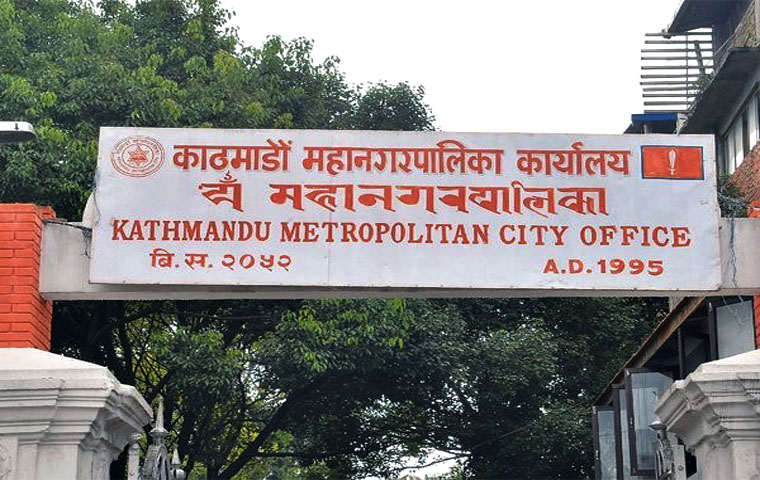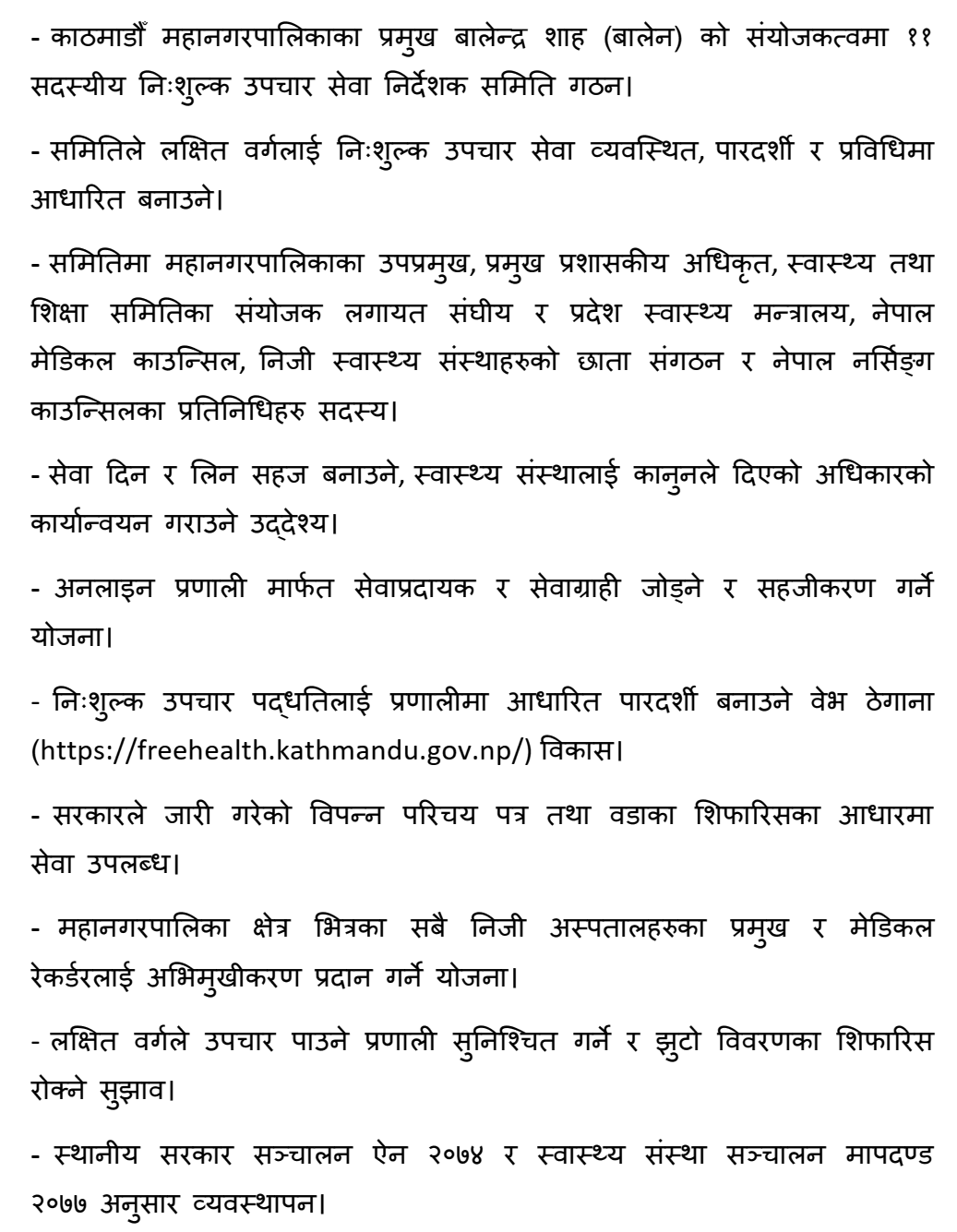
Kathmandu Metropolitan City Initiates Free Treatment Service Directorate
In a significant move towards enhancing healthcare accessibility, Kathmandu Metropolitan City, led by Balendra Shah, has established an 11-member Free Treatment Service Directorate Committee. This initiative is aimed at organizing the free treatment services offered by hospitals, ensuring they are systematic, transparent, and technology-driven for the benefit of the targeted groups.
Committee Composition
The committee boasts a diverse membership, including Deputy Mayor Sunita Dangol, the Chief Administrative Officer of the Metropolitan City Pradeep Periyar, alongside representatives from the Federal Ministry of Health, Province Ministry of Health, Nepal Medical Council, and other key health institutions.
Objectives and Implementation
The primary objective of Kathmandu Metropolitan City's establishment of the Free Treatment Service Directorate Committee is to streamline and enhance the accessibility of free healthcare services for the city's most vulnerable populations. Led by Balendra Shah, the initiative seeks to organize these services in a manner that is systematic, transparent, and leverages technology to efficiently reach the target groups. By implementing the Procedures for Free Treatment, 2080, the committee aims to ensure that the rights provided by the law are effectively utilized, enabling those in need to receive medical care without financial burden.
To achieve these goals, the Directorate Committee includes a diverse group of members from various health and administrative sectors, ensuring a collaborative approach to addressing the healthcare needs of the city's residents. The Metropolitan Municipality's Public Health Department plays a crucial role in this initiative, overseeing the operational aspects and ensuring compliance with the established procedures.
A key component of the implementation strategy is the use of an online platform, which serves as a central repository of information on available services, hospital bed availability, and patient management. This technology-driven approach not only facilitates easier access to services for patients but also aids in the efficient management of resources by healthcare providers. Moreover, the initiative includes orientation and training sessions for hospital heads and medical recorders, equipping them with the necessary tools to navigate the system effectively.
Through this initiative, Kathmandu Metropolitan City demonstrates a strong commitment to improving public health outcomes by making healthcare more accessible and responsive to the needs of its citizens. The implementation of this comprehensive plan, grounded in legal frameworks and operational standards, marks a significant step forward in achieving health equity within the metropolitan area.
Technology Integration for Efficiency
A standout feature of this initiative is the deployment of an online platform (https://freehealth.kathmandu.gov.np/) designed to offer detailed information about hospital services, bed availability, and patient management. This system aims to facilitate the connection between service providers and beneficiaries, ensuring a smooth and hassle-free experience.
Inclusivity and Accessibility
The service targets individuals holding a government-issued indigent identity card and ward recommendations, emphasizing nationwide accessibility. This approach ensures that even the most vulnerable populations have access to necessary healthcare services without financial burden.
Training and Orientation
To ensure the seamless operation of the system, orientation sessions for hospital heads and medical recorders within the metropolitan area are scheduled. This training will equip them with the necessary knowledge to effectively use the system, improving service delivery.
Efforts to Enhance Treatment Accessibility
The Metropolitan Municipality has been proactive in ensuring that hospitals comply with legal requirements to offer free treatment services. These efforts include regular monitoring, stakeholder discussions, and the establishment of a Free Treatment Service Unit to coordinate treatment between hospitals and patients.
Legal Framework and Standards for Free Healthcare Services
Ensuring equitable access to healthcare services is a cornerstone of social welfare and justice. Kathmandu Metropolitan City's initiative to provide free treatment services is anchored in a robust legal framework and adheres to established standards. This section outlines the legal basis and the standards that guide the operation of free healthcare services within the metropolis.
Local Government Operation Act 2074
- Section 11 (4) B 2 grants local governments the authority to regulate health institutions within their jurisdiction. This legal provision empowers local levels, including metropolitan cities, to oversee and ensure the effective operation of health services, aligning with national health policies and standards.
Health Institution Operation Standard 2077
- Chapter 24, Section 70 (d), mandates that a minimum of 10 percent of the total beds in each hospital be allocated for the free treatment of poor, helpless, and destitute patients. This standard is designed to ensure that vulnerable groups have access to necessary medical care without financial hardship.
Procedures for Free Treatment, 2080
- The Metropolitan Municipality has formulated specific procedures to operationalize the legal provisions and standards. These procedures detail the formation of the Directorate Committee, roles and responsibilities of the committee members, and the operational mechanism of the free treatment service unit within the metropolitan city.
- It also outlines the process for patients to apply for free treatment, including the documentation required, the recommendation process by local wards, and the coordination between hospitals and patients to facilitate access to free services.
Technology Integration
- A significant aspect of the legal and procedural framework is the emphasis on using technology to make the free treatment services transparent, efficient, and accessible. The online platform developed by the Metropolitan Municipality serves as a central hub for information on hospital services, bed availability, and patient management, ensuring a seamless link between service providers and beneficiaries.
Ensuring Compliance and Monitoring
- The framework includes mechanisms for regular monitoring and evaluation of hospitals' compliance with the free treatment standards. This ensures that healthcare institutions adhere to the legal requirements and the standards set forth in the Health Institution Operation Standard 2077.
Stakeholder Engagement and Continuous Improvement
- The legal framework and standards emphasize the importance of stakeholder engagement in refining and improving the free treatment services. Feedback from healthcare providers, patients, and other stakeholders is instrumental in identifying challenges and areas for enhancement.
Kathmandu Metropolitan City's establishment of the Free Treatment Service Directorate Committee marks a pivotal step in making healthcare services more accessible and equitable. Through the integration of technology, comprehensive planning, and a focus on transparency, this initiative promises to significantly improve the healthcare landscape for the city's most vulnerable populations.



